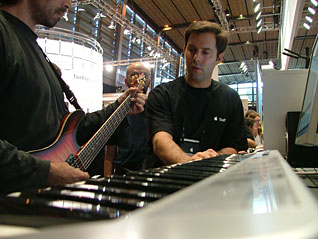
Headlines about the assault on the traditional music industry are a common sight, but most often these articles concern the disruption of traditional distribution and sales mechanisms by peer to peer networks and digital media. Yesterday though, the New York Times ran an article describing the latest discordant notes for the music industry, "Home Sweet Studio", detailing the rise of the home recording studio and digital tools for content creation.
"Mr. Pierce is part of a quiet revolution in music-making: the move from professional studios to home recording. Making an album used to mean booking a fixed amount of very expensive time in a well-equipped but unfamiliar room; now, it can be a matter of rolling out of bed and pressing a button. Whether it's Mice Parade's indie-rock, Aesop Rock's underground hip-hop, the twilit ballads of Keren Ann, the mercurial California rock of the Eels or sweeping Top 40 contenders from Moby, more and more music is emerging not from acoustically perfect state-of-the-art studios, but from setups tucked into bedrooms and basements or simply programmed onto a laptop."
Disrupting the mainstream
Traditional companies in the multi-billion dollar recording industry can be described as providing three major services: distribution & sales, marketing, and recording. The rise of home studios and garage bands foretells the disruption of the third area, recording, but could also have impacts on the first two areas.